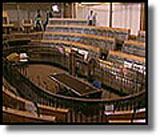
|
Government Determined to Reform Lords after Devolution SetbackThe Government has renewed its pledge to strip hereditary peers of their Parliamentary power after being defeated in the Lords over its devolution plans.Labour drew attention to the Tories' substantial majority in the Lords, and the fact that more than two-thirds of the Conservatives there were hereditary peers, compared with only 15 of Labour's. In its manifesto, Labour promised to end the right of hereditary peers to sit and vote in the House of Lords as the first stage in a process of reform to make the Upper House more democratic. After Thursday night's defeat, a Government source said: "This is not a defeat for the Government, it is a defeat for democracy. Every time the Tories abuse their majority in this way to block manifesto pledges we shall draw attention to the need for reform in this area." The Lords inflicted the Government's first defeat of this Parliament by voting by 101 to 94 - a majority of seven - to back a Tory call for the separate devolution referendums in Scotland and Wales to be held on the same day. This is certain to be reversed by the Labour majority in the Commons when MPs consider the Referendums (Scotland and Wales) Bill. Labour's leader in the Upper House, Lord Richard, said after the vote: "This is the first example in this Parliament of the Conservative hereditary peerage determining a vote in the House of Lords. Of the 90 Conservative peers who voted for the amendment, 52 were hereditary. It is a clear justification of the Government's policy for reform of the Upper House." But he insisted the amendment would not delay the passage of the Bill, which would proceed as planned, with Royal Assent expected by the summer recess so the referendums could take place in the autumn.
Many of those taking the Conservative whip are hereditary peers, but these include numerous so-called "backwoodsmen" who rarely vote. Cossbench peers, many of them hereditaries, comprise a significant bloc in the Lords. Until now, the Tories have been restrained in exploiting their dominance in the House of Lords in the face of Labour's pledge to act on hereditary peers. |
Diana, Princess of Wales, 1961-1997
Conference 97
Devolution
The Archive
News |
Issues |
Background |
Parties |
Analysis |
TV/Radio/Web
Interactive |
Forum |
Live |
About This Site
News |
Issues |
Background |
Parties |
Analysis |
TV/Radio/Web
Interactive |
Forum |
Live |
About This Site
© BBC 1997 |
politics97@bbc.co.uk |

